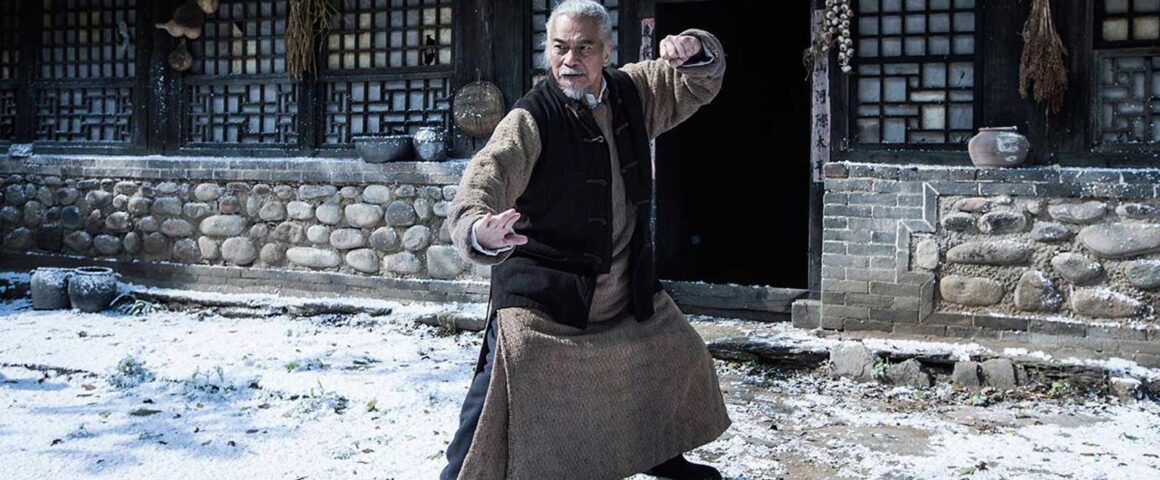Family love and honor are forged in steel for Haofeng Xu’s dazzling generational epic The Hidden Sword, which crisply chronicles China’s early-to-mid 20th century history of war as seen through the eyes of blade-bearing walnut farmers. One family has the film’s focus while Xu allows a curious concoction of quirky humor, astonishing action, and rippling relationship drama to orbit around the Kong clan.
The aging patriarch of the family, played by Kuan Tai Chen, a veteran of Shaw Brothers martial arts movies, which prove an artful influence on Xu, is a mild-mannered man living out his days with his grandson Dingyi (Aoyue Zhang) and adopted granddaughter (of sorts) Qingqing (Chun Xia) in a small village.
Chen’s character exhibits wearying, worrying signs of old age, wandering off at night in routine fashion, but his skills and reputation as a master swordsman remain intact. This is enough to draw attention from and rise the ire of proud soldier Shen Feixue (Geng Le), who so desperately wants to prove himself a worthy opponent to the genteel grandfather that he moves in next door with his alluring wife Zhihui (Xu Qing) and books a year for nothing but sword practice.
That’s not the story that Xu is preparing to tell, though. Instead, Shen completes the year of training feeling down in the dumps about where his skills are at and unable to prove himself even if he wanted to as he’s headed off to war. He leaves his wife behind and disappears, only to seemingly return ten years later in the form of a convincing impostor now played by a charming, slimy Huang Jue.
All of that probably reads like a lot of plot synopsis for a single movie, but it’s only the tip of the acrobatic iceberg in this case. The story is built on a collection of well-explored character arcs, forcing the movie’s many twists and turns to hinge on the decisions of a few key people. This allows Xu to employ multiple moods and tones since each character wants something different.
Dingyi wants only to maintain the prosperity of his family’s walnut farm and therefore the general Kong legacy as well, while the new Shen Feixue craves power by way of the mythic title that comes with being the best of the best with a blade. There are several other arcs given a surprising amount of attention, including one for a clown-like vagabond who takes to spying on Zhihui while she enjoys an outdoor bath.
If one’s motivation is not honor, then it’s vengeance (yes, even the peeping tom comic relief), a theme that plays out in many meaningful, unexpected ways. This is the beauty of The Hidden Sword (other than the literal beauty of the exquisitely shot locations and period-appropriate sets), that the story is so character-driven and that the characters themselves are so unpredictable.
Xu ensures that every person with a decent amount of screen time has an important role to play, so even though the movie is often very comical (this isn’t exactly Stephen Chow, but it could be a distant cousin of his work at times), every decision has a weight to it that strengthens our emotional connection to the story. Even characters that seem to be merely added for flavor eventually reveal hidden personal plans or suffer dark fates.
The world that Xu has created here is a rich one, an accomplishment made all the more impressive by how small an actual space is used to contain what feels like such a large story. We barely and rarely ever leave the village area, confined as cool, collected Dingyi contentedly is and as budding teenager Qingqing frustratedly feels, which affords us a sense of both the comfort of home and the confusion about the outside world.
Woven through this careful narrative tapestry is of course all the much-ballyhooed blade-on-blade action. Xu is well aware that making a movie about legendary martial arts masters skilled in swordplay comes with the requisite expectation that the fight sequences be mightily magnificent, especially considering the sheer ubiquity of martial arts movies and that specifically Wu Xia cinema has long since penetrated even the American mainstream.
Despite the tall order, Xu and everyone from the cast and crew who contribute to the action sequences here rise generously and gleefully to the occasion. It’s difficult to convey in words the beautifully balletic brutality of the battles here, wherein the camera clearly tracks every motion in an engaging, exciting, entrancing manner that never obscures the complexity and depth of talent onscreen and equally never sacrifices the inherent cinematic quality of it all.
Finding that middle ground where the photography doesn’t upstage the in-camera action and yet the action is captured with more than basic point-and-shoot efficiency is a particular challenge that Xu tackles terrifically. We watch as various foes clash in combat so compellingly choreographed that it’s as though we’re watching perfectly rendered geometric patterns formed out of married flesh and steel.
It’s not just the imagery that sings, either. While Chinese action cinema has a long history of exaggerated sound effects, The Hidden Sword seems to exist on a whole other plane of aural artistry. A sword is never wielded, swung, or removed from its sheath without an accompanying zing echoing throughout the theater. Just looking at a sword suggests it can make a sound.
This all adds to the movie’s notion that ultimate lasting power lies in one’s ability to brandish a blade and it also speaks of legacy as the prevailing theme, both for the characters onscreen fighting for sword supremacy and for the movie itself that lovingly looks back on decades of Chinese martial arts cinema. Xu’s The Hidden Sword stuns as it elegantly carves out in its own unique place in a genre that slices our senses with pristine precision.




'Movie Review: The Hidden Sword (2017)' has no comments